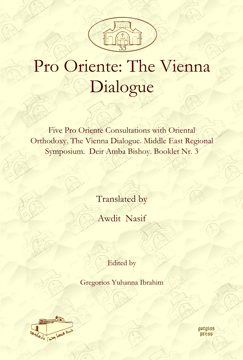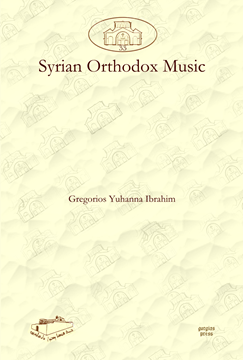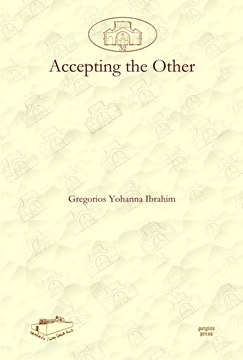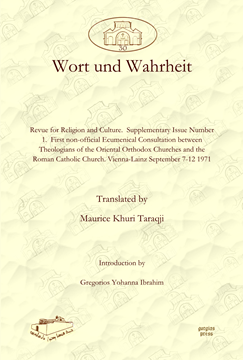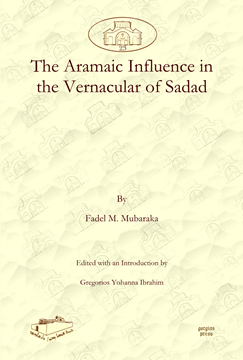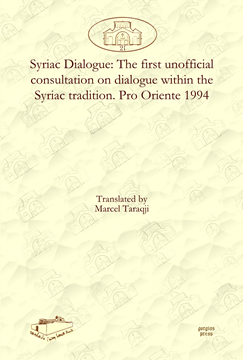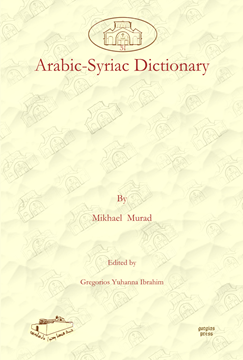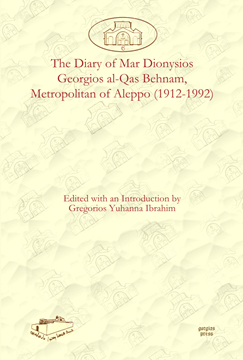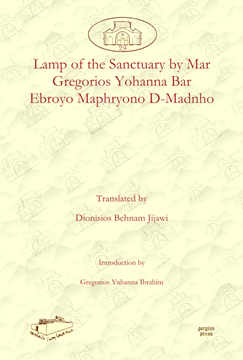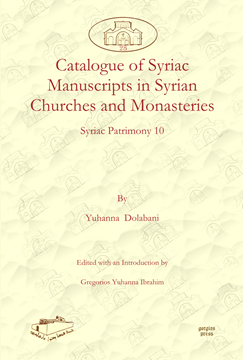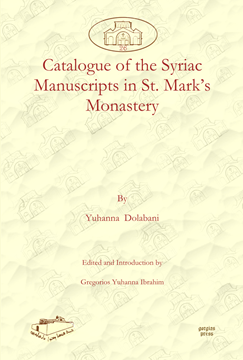Dar Mardin: Christian Arabic and Syriac Studies from the Middle East
Gregorios Yohanna Ibrahim
These are titles published by Gorgias Press that originally appeared in the Dar Mardin press.
The Vienna Dialogue
Five Pro Oriente Consultations with Oriental Orthodoxy. The Vienna Dialogue. Middle East Regional Symposium. Deir Amba Bishoy. Booklet Nr. 3
Translated by Awdit Nasif; Edited by Gregorios Yohanna Ibrahim
ISBN: 978-1-60724-266-6
This book is a translation into Arabic of The Vienna Dialogue: five Pro Oriente consultations with Oriental Orthodoxy/ Middle East Regional Symposium, Deir Amba Bishoy, October 1991 (Vienna, 1991) and contains a number of articles by Roman Catholic and Oriental Orthodox churchmen connected to the question of the relationship between these churches.
$141.00 (USD)
the Vienna Dialogue
Five Pro Oriente Consultations with Oriental Orthodoxy. Communiqués and Joint Documents. Booklet Nr. 1
Translated by Michel Azraq; Edited by Gregorios Yohanna Ibrahim
ISBN: 978-1-60724-265-9
This book is a translation into Arabic of The Vienna dialogue: Five Pro Oriente consulations with oriental Orthodoxy: communiqés and common declarations, edited by Rudolf Kirchschläger and Alfred Stirnemann (Horn, Austria, 1991); it contains a number of documents written by both Roman Catholic and Oriental Orthodox churchmen connected to the question of the relationship between these churches.
$134.00 (USD)
Syrian Orthodox Music
ISBN: 978-1-60724-264-2
This book originated in Bishop Yohanna Gregorios’ dissatisfaction with the lack of a study which would show where the music of the Syrian church came from, how it was accepted in the church, the basis on which it entered the church, the regional variation in chanting traditions, and the development of church music through time.
$127.00 (USD)
Accepting the Other
ISBN: 978-1-60724-263-5
Written by the eminent Syrian Orthodox Metropolitan of Aleppo, Accepting the Other, offers an eloquent and alternative perspective to the question of religious co-existence and the so-called ‘Clash of Civilizations.’ Bishop Gregorios’ book begins with an historical overview of the presence of Christians in the Middle East and their rich cultural contributions to the region, stretching back to the days of the Roman Empire and discusses the Islamic conquests and the Crusades from the little-heard yet extremely important Middle Eastern Christian perspective; he also offers examples of Christian-Muslim co-existence and discusses the question of citizenship.
$169.00 (USD)
Wort und Wahrheit
Revue for Religion and Culture. Supplementary Issue Number 1. First non-official Ecumenical Consultation between Theologians of the Oriental Orthodox Churches and the Roman Catholic Church. Vienna-Lainz September 7-12 1971
Translated by Maurice Khuri Taraqji; Introduction by Gregorios Yohanna Ibrahim
ISBN: 978-1-60724-261-1
This is a translation into Arabic of Wort und Wahrheit: Revue for Religion and Culture, Supplementary Issue Number 1, which contained the papers and minutes of the first non-official ecumenical consultation between Oriental Orthodox and Roman Catholic theologians, sponsored by Pro Oriente, the ecumenical foundation. This volume contains a number of papers by Oriental Orthodox and Roman Catholic theologians relating to Christology, Monophysitism and Dyophysitism, and the acceptance of the Council of Chalcedon.
$198.00 (USD)
The Aramaic Influence in the Vernacular of Sadad
By Fadel M. Mubaraka; Edited with an Introduction by Gregorios Yohanna Ibrahim
ISBN: 978-1-60724-250-5
Fadel Mubaraka has here given us a study of the linguistic survivals of Aramaic in the Arabic dialect of the town of Sadad, in Syria, home to a large Syrian Orthodox community. Arranged alphabetically in the style of a dictionary, Mubaraka lists hundreds of different Arabic words, defines them, and then discusses their Aramaic etymology. Although the focus is on the specific dialect of Sadad, Mubaraka’s work and the words he discusses are not necessarily only to be found in this one location. This work will therefore be of great value to all interested in Arabic dialectology, the Aramaic influence on colloquial Arabic, and in the cultural history of the Levant.
$239.00 (USD)
The first unofficial consultation on dialogue within the Syriac tradition. Pro Oriente 1994
Translated by Marcel Taraqji
ISBN: 978-1-60724-172-0
This volume is a translation into Arabic of the papers published as part of the Pro-Oriente ecumenical consultation between members of Roman Catholic, Chaldean Catholic, Syro-Malankar and Assyrian Orthodox Churches, originally published in Vienna in 1994. Participants included both European and Middle Eastern scholars and paper topics covered a range of issues relating to both the history and theology of the Church of the East.
$195.00 (USD)
His Life and Works
ISBN: 978-1-60724-171-3
Philoxenos Yuhanna Dolabani (1885-1969), Metropolitan of Mardin, was an important figure in the Syrian Orthodox church in the twentieth century and a prolific scholar, most of whose works remain unpublished and unknown to Western scholarship. Bishop Gregorios Yohanna Ibrahim has here given us a biography of this key figure.
$158.00 (USD)
Arabic-Syriac Dictionary
By Mikhael Murad; Edited by Gregorios Yohanna Ibrahim
ISBN: 978-1-60724-262-8
This book is a reprint of Murad’s Arabic-Syriac dictionary, the first such dictionary ever composed, and the only work of the author. The present volume extends from the letter alif to the beginning of the letter sin; the second half of the dictionary has unfortunately been lost. For each Arabic word given, a number of Syriac equivalents are recorded. The dictionary also gives Syriac equivalents to Arabic idioms.
$270.00 (USD)
The Diary of Mar Dionysios Georgios al-Qas Behnam, Metropolitan of Aleppo (1912-1992)
Edited with an Introduction by Gregorios Yohanna Ibrahim
ISBN: 978-1-60724-154-6
Nearly three years were spent assembling and editing this volume, which contains the diary of Mar Georgios Dionysios, the former Bishop of Aleppo. The diary covers the years 1943-1981 and offers a fascinating look at the day-to-day life of an important figure in the Syrian Orthodox Church over the course of nearly 40 years.
$242.00 (USD)
Lamp of the Sanctuary by Mar Gregorios Yohanna Bar Ebroyo Maphryono D-Madnho
Translated by Dionisios Behnam Jijawi; Introduction by Gregorios Yohanna Ibrahim
ISBN: 978-1-60724-260-4
The Lamp of the Sanctuary is the most important theological encyclopedia in the Syriac language and its author Gregory Bar Hebraeus was perhaps the greatest polymath ever to write in Syriac. The book is divided into twelve different sections which span the breadth of medieval theology.
$311.00 (USD)
Catalogue of Syriac Manuscripts in Syrian Churches and Monasteries
By Yuhanna Dolabani; Edited with an Introduction by Gregorios Yohanna Ibrahim
ISBN: 978-1-60724-259-8
This book is a collection of a number of small catalogues and hand-lists of manuscripts held in the possession of Syrian Orthodox churches, monasteries, and even individuals throughout the Middle East. The eminent scholar and bishop, Philoxenos Dolabani, carried out the enormous task of cataloguing and describing these little-known and difficult-to-access collections.
$203.00 (USD)
Catalogue of Syriac Manuscripts in Za‘faran Monastery
By Yuhanna Dolabani; Edited with an Introduction by Gregorios Yohanna Ibrahim
ISBN: 978-1-60724-252-9
This book is a reproduction of Philoxenos Dolabani’s handwritten catalog of the manuscripts contained at Dayr al-Za‘faran. Dolabani was one of the greatest scholars of Syriac in the twentieth century and he made the catalogue while still a monk. This work, two volumes combined under one cover, is an important resource for all interested in Syriac and Christian Arabic.
$283.00 (USD)
Catalogue of the Syriac Manuscripts in St. Mark’s Monastery
By Yuhanna Dolabani; Edited with an Introduction by Gregorios Yohanna Ibrahim
ISBN: 978-1-60724-251-2
This book is a reproduction of Philoxenos Dolabani’s handwritten catalogue of the Syriac, Karshuni, and Arabic manuscripts located in St. Mark’s Syrian Orthodox Monastery in Jerusalem, one of the most important Christian manuscript collections in the Middle East.
$218.00 (USD)

